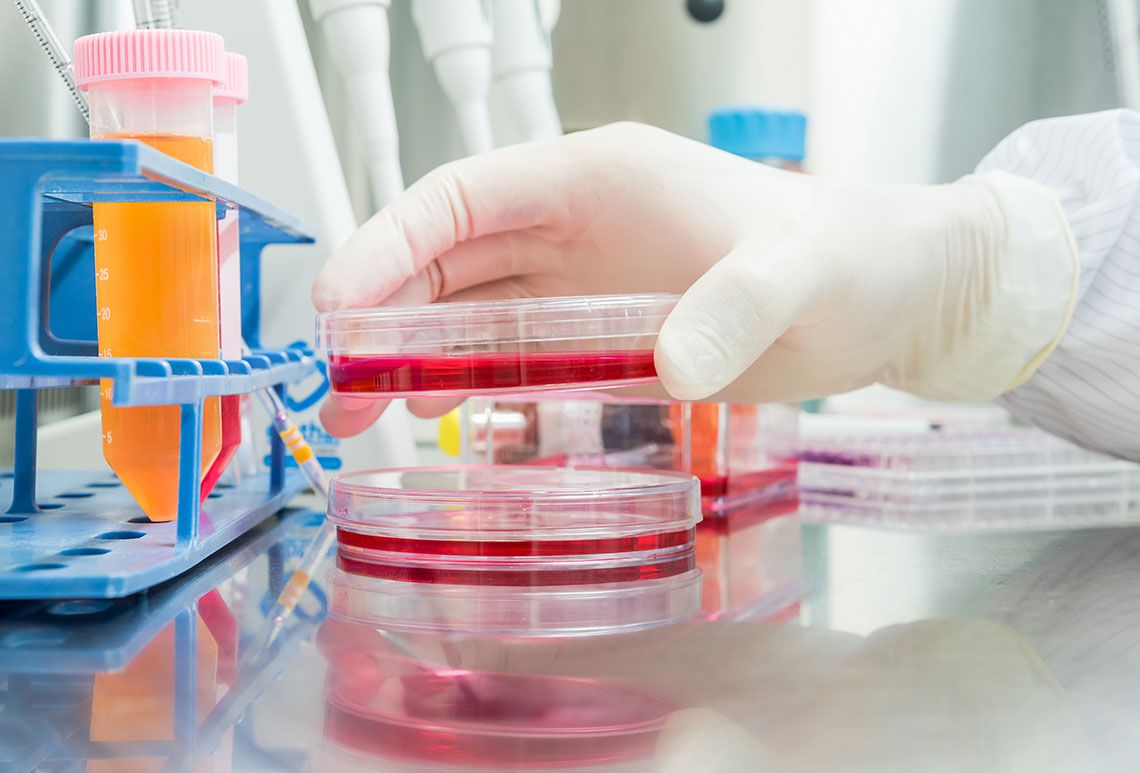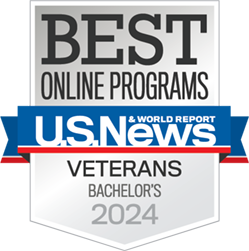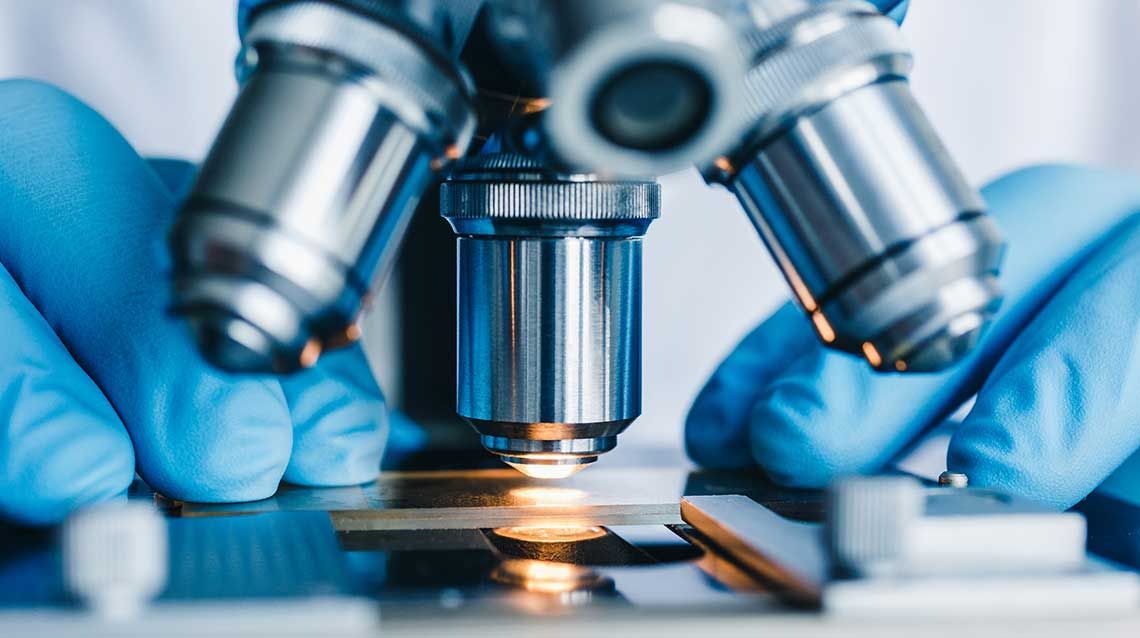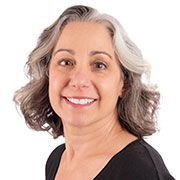
Become a Clinical Microbiologist
Online Coursework
24 Months*
The George Washington University (GW) online Master of Science in Health Sciences (MSHS) in Clinical Microbiology delivers the theoretical knowledge and critical skills needed to be a clinical microbiologist. Clinical microbiologists facilitate the identification of human infectious diseases. This flexible online program combines medical microbiology and laboratory science coursework with a hands-on microbiology practicum (completed in your geographic location). In addition to gaining the skills needed to diagnose infectious diseases, you will develop the knowledge and practical skills to conduct research that helps prevent the spread of infections to create healthier communities.
To learn more about our programs, you can register for our upcoming events.
*The total number of credits and duration of the program depend on the number of transferred credits
Program Highlights
- 100% online coursework; complete your degree in 24 months
- Prepare to sit for the ASCP Technologist in Microbiology exam***
- Applicants with clinical laboratory experience may be eligible to waive individual clinical practicum requirements
- One of a few graduate degrees in the country that provides medical microbiology and laboratory science coursework with a hands-on general microbiology practicum
Request Information
* Indicates required field
- Read: Privacy Disclaimer Acknowledgment
-
By submitting your contact information, you are providing your express consent authorizing GW and GW's representatives to contact you by email, phone, or text (including the use of an automatic dialing system). Standard text messaging and/or data rates may apply.
If you do not provide your contact information (phone and email), we may not be able to provide you with the information you requested.
If you provided your contact information but no longer wish to receive phone calls, emails, or text (SMS) messages from GW, you will have the option to opt-out. Emails and Text messages will include details for unsubscribing/opting out. To opt out of receiving phone calls from GW, contact us via email at info [at] hsprograms [dot] gwu [dot] edu (info[at]hsprograms[dot]gwu[dot]edu) or text/ call: 202-792-2819.
By submitting your information via this form, you also confirm that you have read and understood the GW Statement of Privacy Practices.
Note that the consent requested above is not required for enrollment in GW's programs. If you do not consent to providing the information requested on this form, you may contact us via email at info [at] hsprograms [dot] gwu [dot] edu (info[at]hsprograms[dot]gwu[dot]edu) or text/ call: 202-792-2819.
Accreditation and Rankings
- GW is accredited by the Middle States Commission on Higher Education
- #62 Best National University*
- #13 Best Online Bachelor's Programs*
- #7 Best Online Programs for Veterans*
* The U.S. News & World Report – 2024 Rankings



Program Outcomes
The online MSHS in Clinical Microbiology program leverages distinguished faculty, innovative curriculum, and real-world experience. Upon completion, you’ll gain the comprehensive skills needed to succeed in the medical microbiology field and be able to:
- Interpret patient laboratory results to aid in the diagnosis of infectious disease.
- Assess laboratory methods used to identify infectious agents in the clinical microbiology lab.
- Analyze general and specific mechanisms by which an infectious agent causes disease.
- Assess strategies to treat infectious diseases, including the appropriate use of antimicrobial agents and common mechanisms of antimicrobial action and resistance.
- Adhere to all local, state and federal laboratory regulations to maintain a safe and ethical work environment
Who Is the Ideal Student for This Program?
The MSHS in Clinical Microbiology program is designed for individuals who have a baccalaureate degree and want to obtain employment in clinical or public health microbiology laboratories. Many diagnostic laboratories require employees to be certified and this program will provide the theoretical knowledge, laboratory skill, and ability to sit for a national board of certification examination in microbiology. The ideal candidate for this program is someone that enjoys science and hands-on laboratory work, is detail-oriented, able to multi-task, and someone that likes to solve puzzles.
What Can You Do After Graduation?
The program curriculum provides eligibility for the ASCP Technologist in Microbiology exam, a gold standard in global certification for medical laboratory professionals. This will provide you with the skills needed to compete for the medical microbiology career you want.
Career Outlook
There is a growing need for professionals in medical microbiology. The Bureau of Labor Statistics predicts that the number of available health care jobs will increase through 2030, creating more than two million new positions for medical professionals.1 With this projected growth, now is the perfect time for students to build careers in medical microbiology, clinical pathology, bacteriology, virology, and infectious diseases with the MSHS in Clinical Microbiology program at GW.
Graduates of this program will have the qualifying skills needed for employment in a variety of general microbiology settings, including diagnostic microbiology laboratories, research institutions, public health laboratories, biotechnology firms, pharmaceutical companies, or governmental agencies. Careers in clinical microbiology include:
- Microbiology technologist
- Public health microbiologist
- Microbiology laboratory supervisor
- Research Assistant/Associate
- MLT/MLS instructor
New York residents – We advise applicants considering New York state licensure to review license requirements before accepting admission to the program.
State Licensure
Completion of this program will make graduates eligible to register for an ASCP Board of Certification Exam. However, this does not automatically guarantee a graduate will also meet their state’s licensure requirements (if applicable). States may have specific licensure requirements and each student is encouraged to contact their state’s regulating agency to review these requirements prior to beginning any degree program. State’s requiring licensure may require an extended duration of practicum experiences, additional academic courses (outside the student’s program of study), etc. These additional requirements may require you to take a course or courses outside of GW. In particular, New York and California typically have additional requirements for state licensure. Please also be aware that the state of NY does not provide licensure to individuals that are certified in one subject, hence, this program will not provide eligibility to obtain a NY state license. Students who live in New York or California or plan to relocate to New York or California are recommended to research the NY and CA licensure requirements.
Admission Requirements
To apply for the MSHS in Clinical Microbiology, you’ll need:
| Completed application |
| 3.0 GPA or above on a 4.0 scale |
|
A bachelor’s degree from a regionally accredited institution and the required coursework as follows: 3 credits College Algebra, 3 credits English, 30 credits Biology, Chemistry or Medical Sciences. The 30 science credits must include the following: 4 credits General or Inorganic Chemistry 1 (including a “hands-on” lab), 4 credits General or Inorganic Chemistry 2 (Including lab), 4 credits General Biology 1 (including a “hands-on” lab), 4 credits General Biology 2 (including a “hands-on” lab), 4 credits Microbiology (including a “hands-on” lab). *Please be prepared to provide unofficial transcripts to determine program admissibility |
| Resume/CV |
| Personal statement: Applicants must include a 250–500 word essay describing your reasons for studying at GW, your academic objectives, career goals, and related qualifications, including collegiate, professional, and community activities relevant to your program of interest. Include any substantial accomplishments not already mentioned on the application form. |
| Two letters of recommendation |
Curriculum
- 24-month Duration (36 Credits)
- All courses in this program are taught fully online and in an asynchronous format.
Tuition Details
The MSHS in Clinical Microbiology program at GW consists of 36 credit hours. Please find the cost per credit hour and total estimated program costs here.
Note: Tuition rates are subject to change and additional fees may vary by program.
Meet the Program Director

GW’s experienced faculty provide you with the rich, practical knowledge and support needed for you to succeed in the program and in your career.
Marcia Firmani, PhD, MSPH, MT(ASCP)MBCM
- Read Full Bio
-
Dr. Marcia Firmani has more than 20 years of experience in teaching and research. In addition to her administrative duties, Dr. Firmani both directs and teaches several courses within the BLS department, including Clinical Bacteriology, Molecular Diagnostic Sciences, Molecular Epidemiology, and Plagues, Pandemics & Epidemics. She also mentors undergraduate and graduate research projects and has published peer-reviewed articles with students.
Prior to her arrival at The George Washington University, Dr. Firmani was a principal investigator at the National Biodefense Analysis and Countermeasures Center (NBACC), where she conducted and managed several research projects involving biothreat agent characterization. Dr. Firmani also held two previous faculty appointments.
From 2002–2007, she was an assistant professor in the CLS department at Louisiana State University Health Sciences Center (LSUHSC) in New Orleans. She taught lecture and laboratory courses and directed a research lab where she performed basic and applied research on Mycobacterium tuberculosis and MRSA and mentored master’s student thesis projects.
From 2007–2010, Dr. Firmani was an assistant professor at the University of Wisconsin, Milwaukee (UWM) where she taught various undergraduate CLS courses and graduate-level Biomedical Sciences courses. She also directed a research laboratory where she conducted NIH-funded research on Mycobacterium tuberculosis and mentored both undergraduate and graduate student research projects.
Dr. Firmani has taught numerous continuing education courses in the laboratory science field, including a DVD for the American Society for Clinical Laboratory Science (ASCLS) on emerging infections. She has authored several chapters focusing on infectious diseases in textbooks and has also published her research in peer-reviewed journals, such as Infection and Immunity, and the Journal of Clinical Microbiology.
Sources and Disclaimers:
- Bureau of Labor Statistics (2021 September 8). Healthcare Occupations. Occupational Outlook Handbook. Retrieved February 16, 2022
** National Accrediting Agency for Clinical Laboratory Sciences (NAACLS), 5600 N River Road, Suite 720, Rosemont, IL 60018-5119.
***While the completion of this program will make graduates eligible to register for an ASCP Board of Certification Exam, this does not automatically guarantee a graduate will also meet their states requirements for state licensure (if applicable). Since each state may have different requirements for licensure, each student is encouraged to contact their states regulating agency and review these requirements prior to beginning any degree program.
Curriculum Details
36 TOTAL CREDITS REQUIRED
The Master of Science in Health Sciences (MSHS) in Clinical Microbiology is a 36-credit-hour program that provides students with clinical microbiology and laboratory science online coursework as well as a hands-on microbiology practicum.
Six credit hours of elective courses are selected in consultation with the program director, from existing online graduate courses in Medical Laboratory Sciences or Health Sciences.
Core
- HSCI 6263 Biostatistics for Clinical and Translational Research (3)
-
Basic concepts and methods of biostatistics applied to translational research. Topics include distributions, populations and sample selection, variables, interaction and confounding, hypothesis formulation, correlation, t-tests, ANOVA, regression, and chi.
- MLS 6116 Advanced Clinical Bacteriology I (3)
-
This course covers the pathogenic characteristics, isolation techniques, specimen collection and handling, laboratory identification, and treatment of medically significant bacteria and viruses with an emphasis on current diagnostic techniques used in clinical practice.
- MLS 6117 Advanced Clinical Bacteriology II (2)
-
This course presents the etiology of infectious diseases in different body sites using a case-study‐based approach It emphasizes the epidemiology, pathogenic mechanisms, and laboratory identification of suspected etiologic agents. Commonly encountered clinical species will be discussed using case studies that include clinical history, signs and symptoms, and laboratory test results of diseases produced by the etiologic agents.
- MLS 6119 Advanced Parasitology, Mycology, and Virology (2)
-
This course is designed to provide the student with a systematic approach to the biology and epidemiology of human parasitic, fungal and viral diseases. The course will cover the symptomology, pathology, diagnostic procedures and treatment of the various parasites, fungi and viruses that infect humans. Other topics including disease causation and specimen collection/handling will be discussed.
- MLS 6141 Advanced Immunology and Serology (3)
-
This course covers the principles of the immune system and the clinical applications of immunology related to the diagnosis of human diseases. The first half of the course will focus on the components of the immune system and the various functions of each.
- MLS 6151 Advanced Molecular Diagnostics (3)
-
The advances in scientific technology have expanded the interest and applicability of nucleic acid based analysis within clinical diagnostic laboratories and routine screening procedures. This course provides an overview of molecular biology and genetic concepts as well as the molecular techniques used to diagnose human diseases. The course will emphasize the technology, theory, and methodology of specific molecular protocols that can be utilized within a clinical and research laboratory setting to aid in disease diagnosis, including those of genetic, oncogenic, and infectious origin.
- MLS 6158 Advanced Laboratory Management and Operations (3)
-
An introduction to critical concepts of lab management, including leadership theory, management principles, human resource management, financial management, quality management, and laboratory operations.
- MLS 6216 Microbial Pathogenesis (3)
-
A comprehensive overview of the molecular basis of diseases caused by microbial pathogens with a focus on model microbial systems to illustrate mechanisms of the human infectious disease process.
- MLS 6217 Medical Biotechnology (3)
-
A comprehensive overview of current molecular technologies and how they are used in modern medicine.
- MLS 6244 Research Ethics and Integrity (3)
-
Traditional and modern topics in research ethics and scientific integrity Students will learn to conduct unbiased peer-review, conduct research, and report on an independent case examinations, research misconduct or other ethical issues, and participate in oral scientific and ethical discussions.
- MLS 6251 Advanced Clinical Microbiology Practicum (2)
-
During this practicum course, the student will actively engage in applying the medical knowledge and clinical skills gained in the didactic Advanced Clinical Bacteriology I, Advanced Clinical Bacteriology II, and Advanced Parasitology, Mycology and Virology courses.
Elective - Six Total
- HSCI or MLS Elective (6)
-
HSCI or MLS elective selected in consultation with the advisor.
Key Dates
|
Summer 2026 |
Fall 2026 |
Spring 2026 |
|
| Application Deadline |
March 20, 2026 (Open) |
July 20, 2026 (Open) |
November 19, 2025 (Closed) |
Admissions Requirements
To be accepted to the MSHS in Clinical Microbiology (online coursework), you must have:
| Completed application |
| 3.0 GPA or above on a 4.0 scale |
|
A bachelor’s degree from a regionally accredited institution and the required coursework as follows: 3 credits College Algebra, 3 credits English, 30 credits Biology, Chemistry or Medical Sciences. The 30 science credits must include the following: 4 credits General or Inorganic Chemistry 1 (including a “hands-on” lab), 4 credits General or Inorganic Chemistry 2 (Including lab), 4 credits General Biology 1 (including a “hands-on” lab), 4 credits General Biology 2 (including a “hands-on” lab), 4 credits Microbiology (including a “hands-on” lab). *Please be prepared to provide unofficial transcripts to determine program admissibility |
| Resume/CV |
| Personal statement: Applicants must include a 250–500 word essay describing your reasons for undertaking study at GW, your academic objectives, career goals and related qualifications including collegiate, professional, and community activities relevant to your program of interest. Include any substantial accomplishments not already mentioned on the application form. |
|
Two letters of recommendation Letters of recommendation should be from:
Recommender will submit a letter on letterhead with a signature and credentials/contact information via the application portal. |
| Official transcripts from every college and university attended. All non-U.S. transcripts (including those in English) must be evaluated by an accredited foreign credential agency. Please find the list of member organizations here: https://www.naces.org/members. |
| Application fee: A non-refundable application fee of $80 is required. The application fee is waived for active-duty U.S. military, current GW students, degree-holding GW alumni, current McNair Program Scholars, and graduates of minority-serving institutions (MSI). |
| Students who live outside of the Washington, D.C., metro area are required to secure a satisfactory clinical site at the time of admission. |
| Review the Criminal Background Check and Drug Screening Policies in the Health Sciences Programs Bulletin |
| Since each state may have different requirements for licensure, each student is encouraged to contact their state’s regulating agency and review these requirements prior to beginning any degree program. State’s requiring licensure may require extended duration of practicum experiences. Also, some states, such as New York, do not provide licensure for categorical certification (e.g., Technologist in Microbiology). |
NOTE: This program is authorized, exempt, or not subject to state regulatory compliance and may enroll students from all 50 states, U.S. territories and the District of Columbia.
International Students
Effective Fall 2025
International students should check with individual programs regarding eligibility for visa sponsorship. Generally, online and hybrid programs are not eligible for student visa sponsorship from GW. This would include transfer students from any other institution with an existing visa. To be considered for admission, there are required scores that you will need to meet. Score requirements may differ by school and program so check the admissions requirements for your program.
Applicants who have not completed a post-secondary degree from an institution where English is the sole language of instruction are required to submit TOEFL, IELTS, PTE Academic, or the Duolingo English Test scores to be considered for admission. The following are the minimum scores for admission consideration:
- TOEFL: 600 on paper based, 250 on computer-based, or 100 Internet-based,
- PTE: overall score of 68,
- IELTS: an overall band score of 7.0, with no individual band score below 6.0
- DET overall score of 120.
Undergraduate applicants who meet one of the following conditions may be considered for admission without submitting TOEFL, PTE or IELTS or DET scores:
- You have earned an associate’s degree or higher from an institution where English is the sole language of instruction
- You are a citizen of an English-speaking country
Scores may not be more than two years old. To ensure TOEFL scores are sent to GW, use institutional code 5246. An institutional code is not required to send IELTS or PTE scores to GW. DET scores must be submitted via the Duolingo English Test system directly to GW.
Based on the results of your English Proficiency exam results and your application, you may be required to take English for Academic Purposes (EAP) during your first year of study at GW. Please note that GW evaluates each application holistically so applicants may still be recommended for EAP even if they meet the requirements for exemption. Students placed in EAP courses should anticipate additional tuition expenses as well as possible extension of time needed to complete their degree programs.
Official transcripts from institutions outside the U.S. must be accompanied by an official transcript evaluation from an accredited independent evaluating agency. Please be sure you request a detailed evaluation that includes all course titles, credit hours, grades, U.S. degree equivalency, grade-point averages (GPA), and date of degree conferral (course by course evaluation). For a list of acceptable foreign credential evaluation services, please visit NACES.
Supporting documents not submitted online should be mailed to:
Mail: George Washington University
ATTN: Transcript Processing Center
1415 W 22nd St.
Suite 220
Oak Brook, IL 60523
Alternatively, official electronic transcripts can be sent to: transcripts [at] hsprograms [dot] gwu [dot] edu (transcripts[at]hsprograms[dot]gwu[dot]edu)